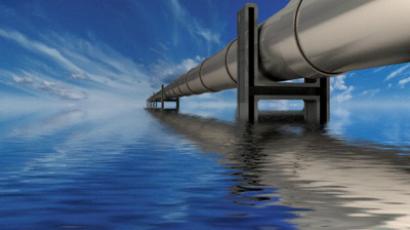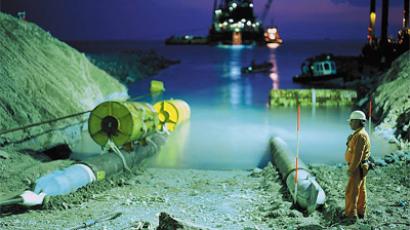EU: We don’t trust you but give us gas
The EU is investigating whether Russian gas giant Gazprom violated competition laws. Despite the distrust, Brussels says it wants a free flow of gas into the EU – a stance observers see as contradictory.
Analysts have been speculating on the reasons behind the EU’s raids on Gazprom’s European offices at the beginning of October. Some believe rivalry could be behind the move.European energy giants Electricité de France and BASF are set to join Russia’s South Stream pipeline to Europe, and that is said to be the death warrant for Nabucco, an EU-backed rival.“Successes of Gazprom were too strong last month and the European Commission has lost, for example, its pet project Nabucco,” says Warsaw-based gas expert, Andrzej Szczeniak. But why would the EU want these raids to spook Russia, a reliable supplier? To renegotiate any contract, Brussels must prove irregularities in deals hammered out with Gazprom’s European subsidiaries – and that seems unlikely.“Nobody really believes that the EU has a strong case for proving their point. We see this more as a measure to increase pressure on Gazprom and Russia,” believes Chris Weafer, Chief Strategist of Troika Dialog Bank in Moscow.The EU says it wants cheaper gas and more players in the market, but its strategy may have one crucial flaw.“They say, ‘Sell our gas to another company when it gets to Europe!’ But that company must make a profit on the deal. And that will immediately raise the price that EU householders pay,” Russia’s Prime Minister Vladimir Putin noted.Experts say the EU is influenced by several anti-Russian hardliners, many of whom are upset at missing out on the opportunity to take part in big energy ventures. This is particularly true of the Baltic nations, which the Nord Stream pipeline bypasses, delivering Russian gas straight to Germany.Instead of complaining, gas experts say they could have moved on and worked with Russia.According to Nina Dyulgerova, a gas expert from Sofia, Lithuania’s anti-Russian inertia will undermine their society, both politically and economically. “At the moment Lithuania is pursuing a one-dimensional policy that, given the problems in the Eurozone, will leave it regretting it did not pursue a more constructive policy with Russia. Bulgaria, for example, signed a new deal with Gazprom which will generate income and contribute to economic stability,” Dyulgerova explains. Emotions are also running high among some European politicians who want to end their reliance on Russian gas, despite efforts by Moscow to diversify routes to ensure a more reliable supply to Europe.“There is a growing number of bureaucrats in Brussels, but also representatives of governments of the EU, who seem to think the unthinkable, in my view – that we don’t need Russian gas at all,” says Alexander Rahr, of the German Council on Foreign Relations. “We unfortunately still live in an era of Cold War stereotypes.”But with no immediate alternative to Russian gas, those stereotypes can only damage the long-term relations between the European energy market and its biggest supplier.














